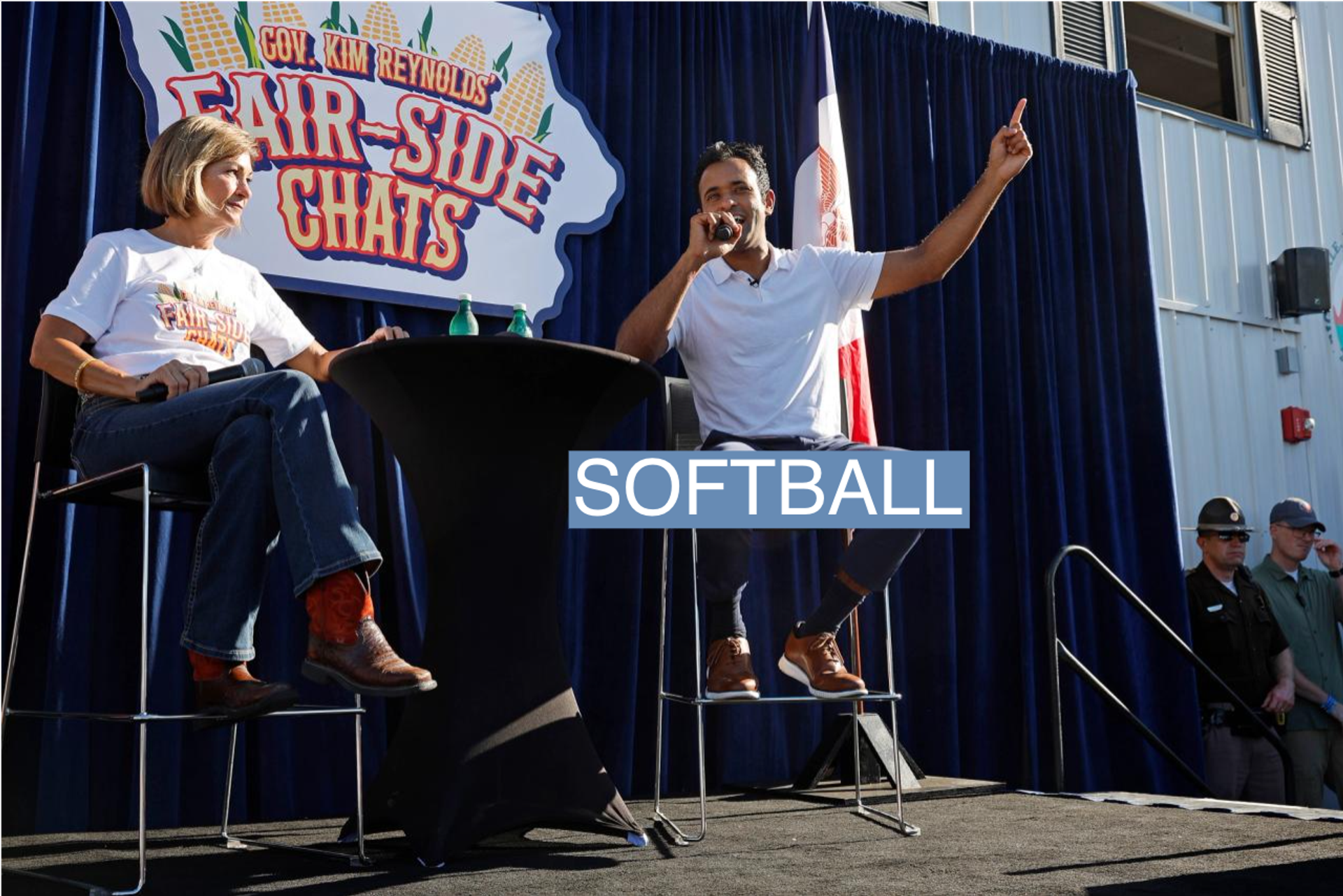The Scene
DES MOINES – The Gannett-owned Des Moines Register is one of those medium-sized American dailies hanging on in a tough environment. Its signature political event is the annual Political Soapbox, long the premier venue for speechifying on the main drag of the Iowa State Fair.
But this year, the Register has a new rival. Republican Governor Kim Reynolds is hosting a series of “Fair-Side Chats” with presidential candidates on the other side of a set of stalls selling pork-on-a-stick, Spam-burgers, and other delicacies.
And Reynolds has the better bookings: Governor Ron DeSantis and Senator Tim Scott, seen as among the campaign’s top tier, are skipping the Register’s wide-open public platform in favor of Reynolds’ safer stage. (Trump, in a snit with Reynolds, did neither.)
Reynolds is a star of retail politics who practically lives at the fair, and a welcoming public presence — but a rookie interviewer. In her first outing Thursday, the radio host and candidate Larry Elder cheerfully rolled over her attempt to ask questions. Friday, she mixed up the state from which North Dakota Governor Doug Burgum hailed, and found herself chiming in “yep, yep” to inanities like Miami mayor Francis Suarez’s declaration, “we’re ideators, we generated ideas.” She got out of the frame for Vivek Ramaswamy’s performance of Eminem’s “Lose Yourself.” It was the safest political space.
Thursday evening, DeSantis and former South Carolina Governor Nikki Haley visited the other main media event of the day, a live taping of the “Ruth-Less” podcast, founded by former aides to Senator Mitch McConnell. Its name refers to the GOP-dominated Supreme Court after Ruth Bader Ginsberg. The podcast is raucous and beloved by the party’s political class, and the Des Moines bar was full of staffers for various campaigns. But its hosts aren’t looking to put their guests in a bad spot —the Republican consultant Eric Wilson called it a “trusting, safe space.”
Thursday night at Johnny’s Hall of Fame in Des Moines, the Ruthless hosts played a game with DeSantis called “Dem or Journo,” reading quotes calling DeSantis things like “fascist dictator” and asking him to guess which quote came from a political enemy, which from the main enemy, the media. He guessed right. “History has shown that siding with Governor DeSantis is has to be the right move when you face a crisis,” one of the co-hosts, who goes by the name Comfortably Smug on Twitter, concluded.
Ben’s view
Public figures’ migration away from neutral or adversarial public platforms and toward safe spaces is a long-running trend, hardly unique to the right. President Joe Biden prefers progressive influencers to tough TV interviews, Elon Musk talks to friendly podcasters like Lex Fridman, and the list goes on.
The shift in Iowa, however, is one more body blow for the role the local media used to play in national campaigns, pulling them away from the polarized national discourse and toward more grounded local issues.
The Register, like virtually every American newspaper, has denounced Donald Trump on its editorial pages. But Reynolds’ move on her hometown paper is new, and the Register has not always been an automatically Democratic outlet. The paper endorsed Mitt Romney over Barack Obama in 2012, and its lead political reporter, Brianne Pfannenstiel, is well-regarded by the local Republicans on whom she regularly breaks news. (When Reynolds “gets the inevitable Fox News show, this will have been good practice,” grumbled a top State Senate Democrat, Zach Wahls.)
But Iowa, which seemed at times to set the culture of presidential politics, is now mostly subject to the same national trends of a new era of hyper-polarized politics and partisan media. The notion of a neutral platform has nearly dissolved, and — particularly in primary season — the leading candidates see no rewards in reaching toward the center. And Trump helped shift Republicans from hating the legacy media to merely mocking it, the theme of Ruth-less.
The View From Western Iowa
“What you’re seeing at the state fair is what’s happening everywhere,” said Kyle Munson, a former Register reporter who is president of the Western Iowa Journalism Foundation.
His foundation is trying to support and revive community journalism in the state’s rural western regions, where publications like the twice-weekly Storm Lake Times used to be essential parts of the political infrastructure.
The sheer proximity of community journalism to the people local journalists cover — the fact that editors and public officials have to make eye contact, and shake hands — is one antidote to polarization, he noted.
Room for Disagreement
Benjy Sarlin noted in Semafor that Donald Trump never limited himself to an alternative conservative media space:
“Trump, who has done more to rally conservatives against the press than any modern politician, has also been more eager to cultivate a relationship with them than his chief opponent, Ron DeSantis, who has largely resisted interviews and engagement with non-conservative outlets.”
And in fact, DeSantis’ recent campaign reset has come with a modest amount more openness to the press.
Notable
- “Without a source of news on local matters of shared interest, people instead turn to the polarizing environment of national news,” the Post’s Dana Millbank wrote in a moving column on community journalism.
- Debate requirements are competing with Iowa caucusgoers for candidate’s attention, the dean of the Iowa press corps, O. Kay Henderson, wrote: “It’s probably more important for candidates at this point who are trying to find those donors to get themselves on Fox and get some attention for themselves than to campaign in Iowa, which isn’t really going to drive any small dollar donations into their campaign,” the veteran GOP operative David Kochel told her.
- DeSantis’s team had local law enforcement block a political journalist from the site Iowa Starting Line from one of his events. Our Dave Weigel reports that the campaign’s explanation was that the reporter registered as an attendee, not press. Rushing called it “bizarre” in an email to me.
